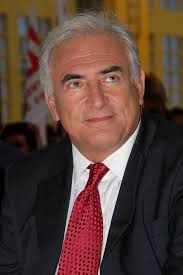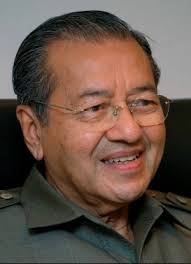
Nov 6th 2008 | BANGKOK
From The Economist print edition
A new leader mired in accusations
ONE could certainly say that Najib Razak was born to be Malaysian prime minister. He is the son of Abdul Razak, the second man to hold that job following independence from Britain, and the nephew of his successor, Hussein Onn. Elected to parliament aged 23, on his father’s death, he rose to become deputy to the present prime minister, Abdullah Badawi. However, Mr Najib, expected within months to become the country’s sixth post-independence leader, will enter under a cloud of allegations, including ones linking him to a murder case, all of which he categorically denies. But some Malaysians will be wondering if he is a fit person to lead them.
 Facing a revitalised opposition, in an election earlier this year the governing coalition, led by the United Malays National Organisation (UMNO), lost the two-thirds majority it needs to change the constitution. Since then, the knives have been out for Mr Badawi. Despite his efforts to cling on he is being forced to quit next March. The contest to succeed him as party president, and thus prime minister, at first promised to be lively. But party officials, fearful of the challenge from the opposition leader, Anwar Ibrahim (a former UMNO deputy leader), chose to hang together rather than hang separately. By November 2nd Mr Najib had won enough nominations to block his only rival, Razaleigh Hamzah, a former finance minister, from getting on the ballot-paper. The quizzical Mr Najib (left)
Facing a revitalised opposition, in an election earlier this year the governing coalition, led by the United Malays National Organisation (UMNO), lost the two-thirds majority it needs to change the constitution. Since then, the knives have been out for Mr Badawi. Despite his efforts to cling on he is being forced to quit next March. The contest to succeed him as party president, and thus prime minister, at first promised to be lively. But party officials, fearful of the challenge from the opposition leader, Anwar Ibrahim (a former UMNO deputy leader), chose to hang together rather than hang separately. By November 2nd Mr Najib had won enough nominations to block his only rival, Razaleigh Hamzah, a former finance minister, from getting on the ballot-paper. The quizzical Mr Najib (left)
Like Mr Badawi before him, Mr Najib comes to the job promising reforms, including of the system of preference for members of the ethnic-Malay majority for state contracts and jobs. Mr Badawi achieved little, though he allowed a bit more freedom of expression than had his predecessor, Mahathir Mohamad. Expectations for Mr Najib are lower still. It is possible, notes Edmund Gomez, a political scientist, that he will use the worsening economic outlook as a pretext for reverting to Mahathir-style repression.
Mr Anwar has failed to carry out his threat to topple the government through a mass defection of parliamentarians. Even so, there is a palpable fin de régime air around UMNO. Mr Badawi, Mr Mahathir and other leaders are publicly lamenting how corruption and cronyism are rife in the party. But his opponents say Mr Najib is hardly the man to restore confidence. In the latest scandal to which they are linking him, the defence ministry (which he oversaw until recently) has deferred a big order for helicopters following questions about their high price. A parliamentary committee this week cleared the government of wrongdoing, but admitted not investigating whether “commissions” were paid.
In an earlier case, a company the opposition claimed was linked to Razak Baginda, an adviser to Mr Najib, was paid juicy fees for services provided over a contract for the purchase of French submarines. A Mongolian woman, said to have worked as a translator in the negotiations, was shot dead and her corpse destroyed with explosives in 2006. Mr Razak was put on trial over her killing, along with two policemen. The case has dragged on for months and seen various odd goings-on, including changes of judge, prosecutors and defence lawyers at the start of the trial. A private detective signed a statutory declaration implicating Mr Najib, retracted it the next day, saying it had been made under duress. Calls by the victim’s family for Mr Najib to testify were rejected. On October 31st the judge ruled that the prosecution had failed to make a prima facie case against Mr Razak.
The policemen’s trial will continue. A blogger who linked Mr Najib's wife to the case is on trial for criminal libel. None of this, however, seems likely to interfere with Mr Najib’s accession to the prime minister’s job. A bigger threat may yet emerge from the resurgent opposition and Mr Anwar, who nurtures a long-thwarted ambition to take the job himself.
A new leader mired in accusations
ONE could certainly say that Najib Razak was born to be Malaysian prime minister. He is the son of Abdul Razak, the second man to hold that job following independence from Britain, and the nephew of his successor, Hussein Onn. Elected to parliament aged 23, on his father’s death, he rose to become deputy to the present prime minister, Abdullah Badawi. However, Mr Najib, expected within months to become the country’s sixth post-independence leader, will enter under a cloud of allegations, including ones linking him to a murder case, all of which he categorically denies. But some Malaysians will be wondering if he is a fit person to lead them.
 Facing a revitalised opposition, in an election earlier this year the governing coalition, led by the United Malays National Organisation (UMNO), lost the two-thirds majority it needs to change the constitution. Since then, the knives have been out for Mr Badawi. Despite his efforts to cling on he is being forced to quit next March. The contest to succeed him as party president, and thus prime minister, at first promised to be lively. But party officials, fearful of the challenge from the opposition leader, Anwar Ibrahim (a former UMNO deputy leader), chose to hang together rather than hang separately. By November 2nd Mr Najib had won enough nominations to block his only rival, Razaleigh Hamzah, a former finance minister, from getting on the ballot-paper. The quizzical Mr Najib (left)
Facing a revitalised opposition, in an election earlier this year the governing coalition, led by the United Malays National Organisation (UMNO), lost the two-thirds majority it needs to change the constitution. Since then, the knives have been out for Mr Badawi. Despite his efforts to cling on he is being forced to quit next March. The contest to succeed him as party president, and thus prime minister, at first promised to be lively. But party officials, fearful of the challenge from the opposition leader, Anwar Ibrahim (a former UMNO deputy leader), chose to hang together rather than hang separately. By November 2nd Mr Najib had won enough nominations to block his only rival, Razaleigh Hamzah, a former finance minister, from getting on the ballot-paper. The quizzical Mr Najib (left)Like Mr Badawi before him, Mr Najib comes to the job promising reforms, including of the system of preference for members of the ethnic-Malay majority for state contracts and jobs. Mr Badawi achieved little, though he allowed a bit more freedom of expression than had his predecessor, Mahathir Mohamad. Expectations for Mr Najib are lower still. It is possible, notes Edmund Gomez, a political scientist, that he will use the worsening economic outlook as a pretext for reverting to Mahathir-style repression.
Mr Anwar has failed to carry out his threat to topple the government through a mass defection of parliamentarians. Even so, there is a palpable fin de régime air around UMNO. Mr Badawi, Mr Mahathir and other leaders are publicly lamenting how corruption and cronyism are rife in the party. But his opponents say Mr Najib is hardly the man to restore confidence. In the latest scandal to which they are linking him, the defence ministry (which he oversaw until recently) has deferred a big order for helicopters following questions about their high price. A parliamentary committee this week cleared the government of wrongdoing, but admitted not investigating whether “commissions” were paid.
In an earlier case, a company the opposition claimed was linked to Razak Baginda, an adviser to Mr Najib, was paid juicy fees for services provided over a contract for the purchase of French submarines. A Mongolian woman, said to have worked as a translator in the negotiations, was shot dead and her corpse destroyed with explosives in 2006. Mr Razak was put on trial over her killing, along with two policemen. The case has dragged on for months and seen various odd goings-on, including changes of judge, prosecutors and defence lawyers at the start of the trial. A private detective signed a statutory declaration implicating Mr Najib, retracted it the next day, saying it had been made under duress. Calls by the victim’s family for Mr Najib to testify were rejected. On October 31st the judge ruled that the prosecution had failed to make a prima facie case against Mr Razak.
The policemen’s trial will continue. A blogger who linked Mr Najib's wife to the case is on trial for criminal libel. None of this, however, seems likely to interfere with Mr Najib’s accession to the prime minister’s job. A bigger threat may yet emerge from the resurgent opposition and Mr Anwar, who nurtures a long-thwarted ambition to take the job himself.






















